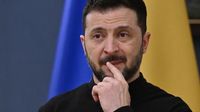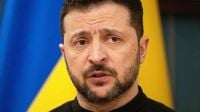The ongoing conflict between Ukraine and Russia has seen a new chapter unfold as the United States announced a tentative agreement aimed at halting hostilities in the Black Sea region. This development comes after three days of negotiations involving representatives from both countries in Saudi Arabia, where discussions focused on ensuring safe navigation and preventing military use of commercial vessels. However, Ukrainian President Volodymyr Zelenskyy has expressed skepticism about the sincerity of Russia's intentions, citing a lack of trust in President Vladimir Putin's government.
On March 25, 2025, the White House confirmed that both Ukraine and Russia had agreed to a framework that includes a pause in naval and energy attacks. The agreement is seen as a potential step towards a more comprehensive ceasefire, albeit one filled with uncertainties. Zelenskyy stated, "Now, results are needed from Russia. We do not trust them. And frankly -- the world doesn't trust Russia. And they must prove that they are truly ready to end the war."
Despite these diplomatic efforts, hostilities have continued unabated. Overnight on March 25, Ukraine's air force reported that Russia launched a significant drone assault, deploying 117 drones against various regions, including Sumy, Dnipropetrovsk, Kirovohrad, and Cherkasy. Ukrainian defenses managed to intercept 56 of these drones, with 48 reported as lost in flight. Zelenskyy condemned the attacks, stating, "There were 117 more pieces of evidence in our sky that Russia is dragging out this war -- 117 strike drones. To launch such large-scale strikes after ceasefire negotiations is to show everyone in the world that Moscow is not going to make a real peace."
In the wake of the negotiations, both sides have released differing accounts of what was agreed upon. The U.S. has indicated that part of the deal includes restoring Russia's access to international markets for agricultural exports and fertilizers, contingent upon the lifting of certain Western sanctions. This aspect of the agreement has drawn criticism from Ukrainian officials, who argue that any concessions could undermine their negotiating position. A senior Ukrainian official, who spoke on the condition of anonymity, asserted that Kyiv would not agree to lifting sanctions as a condition for the maritime ceasefire.
Russian Foreign Minister Sergey Lavrov has stated that Moscow is open to reviving the Black Sea shipping deal, which had previously been suspended. However, Lavrov emphasized that any agreement would require guarantees that Russian interests are protected, including the lifting of sanctions against the Russian Agricultural Bank and other financial entities involved in food and fertilizer trade. The Kremlin's insistence on these conditions has led to further complications, as Zelenskyy reiterated that such demands would weaken Ukraine's negotiating stance.
Amidst the backdrop of these negotiations, the humanitarian toll of the conflict continues to rise. Ukraine's Deputy Foreign Minister Mariana Betsa reported that nearly 600 children have been killed since the onset of the war, with over 1,700 injured. She noted, "Every week, at least 16 Ukrainian children are either killed or injured by missile attacks." Furthermore, reports have emerged indicating that approximately 20,000 Ukrainian children have been abducted by Russian forces, raising alarms about their treatment and potential conscription into the military.
In a related development, the Kremlin has asserted that President Putin's order to halt strikes on energy infrastructure is being adhered to, with a 30-day moratorium on such attacks officially in place since March 18. However, Zelenskyy has expressed doubts about the effectiveness of this ceasefire, suggesting that Russia's continued drone strikes undermine any claims of compliance. He remarked, "Launching such large-scale attacks after ceasefire negotiations is a clear signal to the whole world that Moscow is not going to pursue real peace. Strong steps from the world and clear pressure on Russia are needed."
The situation remains fluid as both sides navigate the complexities of the ceasefire negotiations. Zelenskyy has called for increased international pressure on Russia, urging the U.S. to impose more sanctions to halt the ongoing strikes. Meanwhile, the U.S. has reiterated its commitment to facilitating the exchange of prisoners of war and the return of forcibly transferred Ukrainian children, aiming to address some of the humanitarian concerns arising from the conflict.
As the world watches closely, the coming days will be critical in determining whether the latest diplomatic efforts can yield meaningful results or if the cycle of violence will continue. The stark reality remains that both sides are still engaged in military operations, and the path to a lasting peace appears fraught with challenges. The international community's role in pressuring Russia and supporting Ukraine will be pivotal in shaping the future of the region.
In conclusion, while the tentative agreement brokered by the U.S. offers a glimmer of hope for de-escalation in the Black Sea, the lack of trust between Ukraine and Russia, coupled with ongoing military actions, casts a long shadow over the prospects for peace. The next steps taken by both nations will be crucial in determining whether this latest diplomatic initiative can succeed or if it will falter under the weight of continued hostilities.






